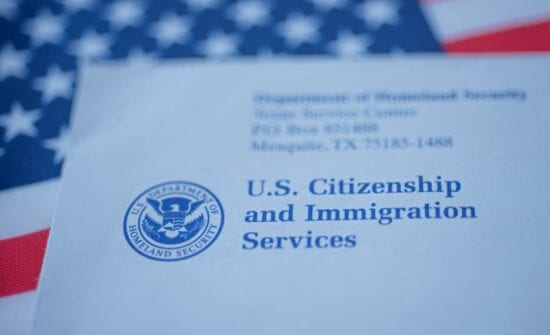What are immigration scams?
A scam or fraud is when someone lies to steal your personal information or money. It is illegal yet common. You may come across immigration scams as you apply for immigration services. Personal information is used to steal your identity and may include:
- your name and address
- bank account and credit card numbers
- social security number
- medical insurance numbers
If someone is asking for these details, be careful. Only give this information to someone you trust. Do not give this information to anyone who asks over the phone, email, text, or social media.
Immigration fee scams
Scams asking for payments for immigration fees are common. Immigration fees and applications are handled through U.S. Citizenship and Immigration Services (USCIS), the U.S. Department of State (DOS) and the Department of Justice’s (DOJ) Executive Office for Immigration Review (EOIR).
USCIS will only accept payments online through your myUSCIS account or by mail through their official lockbox locations. When you are completing an application online, you will be directed to pay the fees at pay.gov.
USCIS will never ask for:
- Payment over the phone or by email
- Payment through services like Western Union, MoneyGram, PayPal, Venmo, Cash App, Zelle, gift cards, or cryptocurrency
- A money transfer to someone or to pay an individual
| All USCIS and EOIR immigration forms are free on USCIS.gov and justice.gov. No one should charge you for a form. |
Legal immigration scams
Be careful when seeking legal help. Only attorneys and DOJ-accredited representatives are authorized to give legal advice.
Notarios Publicos
In many Latin American and European countries, notario publicos (notaries public) are licensed attorneys authorized to give legal advice.
In the United States, notarios administer oaths and witness the signing of important documents. Notaries public in the U.S. are not trained or authorized to provide any legal services. Notarios in the United States who are trying to scam you may:
- Pretend to offer legal services
- Offer to submit USCIS applications without the needed expertise
- Keeps your original documents
- Ask you to sign blank forms with false information
- Give false legal advice that creates problems in your immigration case
Tip:
- Make sure you get legal advice from a licensed immigration attorney or accredited legal representative. Learn how to find legal providers you can trust.
Immigration scam websites
An immigration scam website could pretend to offer instructions and help to file a USCIS application. Scam websites will sometimes try to look similar to official sites and may use the same style or official seal. They may have odd typos.
Tips:
- Make sure the website is secure with “https” address and a lock icon (🔒)
- Official government sites end in .gov
- Use official sites: USCIS.gov, DHS.gov, justice.gov
- Download free government forms from the official website
- Do not use sites that try to have a similar address like USCIS-online.org
- Update your phone and computer systems when new versions are released
- Use strong passwords and two-factor authentication
Immigration scam emails
Scam emails are very common. Many scam emails have files or links that download malware on your device when you click on them. They may ask for personal information, such as account numbers, or ask for payments.
Suspicious emails may have:
- Odd typos, such as in your name
- Strange characters and varying fonts
- Links to fake government websites
Tips:
- Do not open suspicious emails
- Be careful when opening an email from someone you do not know
- All emails from USCIS or the U.S. government will always end in .gov
- Do not click on any links
- Google or type in the website address instead of clicking on links
- Do not make payments through email
- Do not respond to suspicious emails
- Be cautious of any email stating it has a USCIS decision
- Go to myUSCIS to check that you are getting the correct information (all important updates will be there)
| [email protected] is a fraudulent email. Do not open emails from this address or click any of its links. |
Immigration scam calls and texts
Most people get scam calls and text messages. Scammers often change their caller ID to match your area code so you will pick up.
A scam caller may:
- pretend to be an immigration officer
- ask for personal information or payment
- say your information is wrong or that you owe fees and threaten to report you
Tips:
- USCIS does not ask for personal information or payments over the phone
- Check with USCIS or EOIR if you are unsure if a call is real
- Find agency contacts on an official site
- Hang up on suspicious calls and do not try to call them back
- Block unwanted calls and text messages
- Contact an immigration attorney or representative if you have questions
Scammers may also contact you on social media to offer support with an immigration application, such as humanitarian parole. USCIS will not contact you through Facebook, Twitter, LinkedIn, WhatsApp, or other online platforms.
Common immigration scams
Here is a list of specific immigration scams authorities are sharing with the public. Read the instructions on applications to know where to send them and find out if you are approved.
Immigration enforcement scams
Scammers may impersonate ICE officers to target you. They may call, text, email, or message you on social media asking for personal information or money to avoid deportation. ICE and local police should not contact individuals to warn them about deportation.
If someone stops you claiming to be an immigration officer, ask to see their badge and find out which department they work for. Do not sign any paperwork without a lawyer. Be prepared for ICE raids.
Afghan personal information scams
Afghan personal information scams may ask you to share personal information to help you get immigration benefits. USCIS does not generally send emails informing you that you have been approved for a certain immigration benefit.
Expediting processing scams
Expediting processing scams may promise to get you a visa, Green Card, or work permit faster if you pay a fee. They call this “jumping the line.” They may also say they have contacts in the government to expedite your case. No one can expedite services beyond the normal immigration processing times.
Form I-9 email scams
Form I-9 email scams may ask employers for Form I-9 information, pretending to be USCIS officials. Employers do not have to submit Form I-9 to USCIS.
Humanitarian parole scams
Humanitarian parole scams may target immigrants and sponsors to take advantage of them. Scammers may reach out to you online or through social media and offer to be your supporter in exchange for a fee or personal information like your passport number or date of birth.
Sponsors are responsible for providing financial support to beneficiaries for up to 2 years. Beneficiaries are not required to repay or work for their sponsor. Sponsors and beneficiaries do not have to pay a fee to submit an application.
Human trafficking scams
Human trafficking scams may result from employment scams that involve suspicious job offers sent overseas or by email. Human trafficking includes situations where you are forced to work a job and are unable to leave because of threats, debt, and immigration status. Do not pay anyone who promises you a job or certificate.
Find safety tips to avoid human trafficking.
Refugee scams
Refugee scams tell you they are eligible for a special government grant and ask you to pay first or share your bank details. These scams ask for money to help you with your immigration status.
TPS scams
TPS scams often offer false information about re-registering for TPS. These scams may ask you to submit forms and payments to renew your TPS. It is free to renew. Do not pay for or file any form until USCIS has updated official TPS information online.
Visa lottery scams
Visa lottery scams may say you have been selected for the Diversity Visa (DV) program. The State Department will not send you emails about being selected for the visa lottery. The visa lottery is free. You do not have to pay a fee to apply.
How to report immigration scams and fraud
Reporting immigration scams can get you help. It can also help make sure that others do not experience the same thing. You can report a scam anonymously and do not have to give your name. You can also file a report on behalf of someone else.
Be sure to collect specific information about the fraud or scam:
- Date, time, and location of the incident
- Names and contact information of the individual or business involved
- Description of the violation
Report to |
Type of scam |
|---|---|
Immigration benefits scams |
|
Immigration scams |
|
Immigration court proceeding scams |
|
Human trafficking scams |
|
Suspicious emails, websites, or social media accounts that claim to be affiliated with USCIS |
|
General scams |
|
Lost money or property |
|
Fraud |
|
Internet scams |
|
Employer fraud and abuse |
Talk to a trusted family member or friend or your local immigrant organization if you need support. Find more help if someone is threatening you.
Be careful with other false information
There is a lot of false information being shared, especially around the topic of immigration. Be aware of disinformation and misinformation.
Disinformation is often called fake news. It is intended to influence your opinion. Misinformation is not intentionally meant to mislead you but still gives you incorrect information.
Tips:
- Pay attention to where your news and information are coming from
- Be cautious with the information you get on social media
- Check for the original sources within the article or post
- Read about the author and organization to see if they are reliable
- Verify the information in another source
Amakuru ari kuri iyi paji aturuka kuri FTC, USCIS, DOJ, USA.gov, n'ahandi hizewe. Dufite intego yo gutanga amakuru yoroshye gusobanukirwa kandi avugururwa mu buryo buhoraho. Aya makuru si inama mu by’amategeko.



